One of my clients, new to Austin, recently asked me, “What’s up with chickens on campus? Seems like all the cool schools around here have them.” We Austinites love our backyard chickens, and I am no exception, but her question got me thinking. Why do so many alternative schools, each with a different educational approach, make hens and other domestic animals important parts of their curricula and learning environments?
I asked educators and students in the local alt ed community. Their answers—some detailed and complex, others beautifully simple—were full of surprises and insights. Here’s what they shared, in words and pictures.
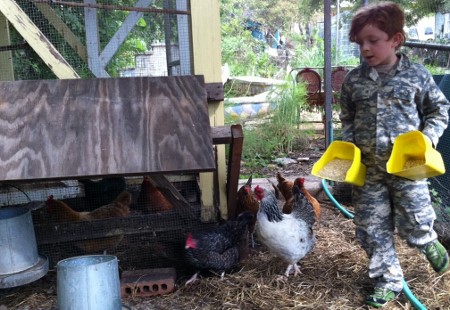 Animals are an important part of our community at the schoolhouse. They help us meet our commitment to real sustainability, and they are wonderful companions too! We keep chickens at the neighborhood garden on our block. Every day the kids have jobs to contribute to the work of the schoolhouse. Each week they take a turn on Kitchen Patrol or Chicken Patrol. The Chicken Patrol feeds, waters, fills the nesting boxes with straw, collects eggs, and enjoys the company of our eight hens. We find it a wonderful way to build connection, feed kids’ curiosity about living things, and teach responsibility and practical skills as well. It is also a visceral encounter with “closing the loop”: we use our chicken poop to fertilize our garden beds via a “chicken tractor”; the feathered ladies scratch and turn up the ground, eating bugs and depositing free fertilizer in the garden!
Animals are an important part of our community at the schoolhouse. They help us meet our commitment to real sustainability, and they are wonderful companions too! We keep chickens at the neighborhood garden on our block. Every day the kids have jobs to contribute to the work of the schoolhouse. Each week they take a turn on Kitchen Patrol or Chicken Patrol. The Chicken Patrol feeds, waters, fills the nesting boxes with straw, collects eggs, and enjoys the company of our eight hens. We find it a wonderful way to build connection, feed kids’ curiosity about living things, and teach responsibility and practical skills as well. It is also a visceral encounter with “closing the loop”: we use our chicken poop to fertilize our garden beds via a “chicken tractor”; the feathered ladies scratch and turn up the ground, eating bugs and depositing free fertilizer in the garden!
The kids just love playing with the birds, and are so proud to take home eggs each week. We have a Coop Co-op where participating parents bring in a bag of feed in exchange for a turn on the egg rotation. Fresh eggs can’t be beat! And the kids get the pleasure of sharing the bounty with their families at home.
We also have two cats at the schoolhouse: Super Cat, and the more elusive Guthrie. Everyone works to build the trust of the cats, learns how to pet them gently, and is always on the lookout for a Guthrie spotting. (She is the more skittish and of course becomes the prodigal cat when she sneaks up on the porch during the quiet of Class Lesson time!) The kitties often provide a cozy comfort to someone who needs a little love.
—Caitlin Macklin, founder and mentor, 9th Street Schoolhouse
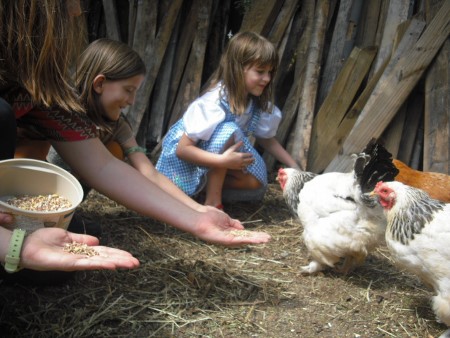 The Austin EcoSchool community was recently joined by a cheerful flock of seven fowl: six hens and one rooster who has very feathery feet! Our flock was donated by a parent who has been raising chickens and goats in the city for some time.
The Austin EcoSchool community was recently joined by a cheerful flock of seven fowl: six hens and one rooster who has very feathery feet! Our flock was donated by a parent who has been raising chickens and goats in the city for some time.
In our Morning Circle last week we talked about chickens, what we know and don’t know about taking care of them. Many of the kids have had some experience and were generous with their knowledge—thank goodness, since I know so very little about the subject!
The kids are, of course, all agog at the new additions and spend time with them every day. We’ve been collecting eggs and using them in various cooking projects. There is talk of selling eggs a little later on. We’re also planning to add some chicks to the flock, and eventually we’ll even have pygmy goats!
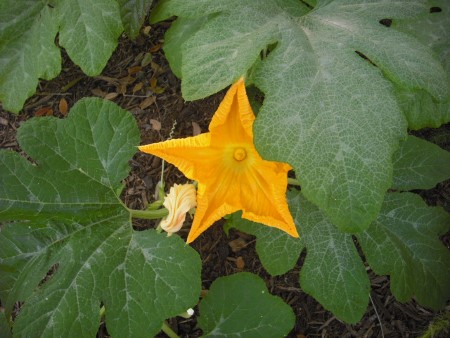 On the subject of urban school farms, our squash plants are going bonkers; there are squash blossoms everywhere! The baby fig tree has wee, cute baby figs on it, and the asparagus plant is pushing up more asparagus shoots. It’s amazing what some rain will do!
On the subject of urban school farms, our squash plants are going bonkers; there are squash blossoms everywhere! The baby fig tree has wee, cute baby figs on it, and the asparagus plant is pushing up more asparagus shoots. It’s amazing what some rain will do!
We’re so excited to be expanding our school farm and edible campus, and I invite everyone to come by and check it out.
—Cheryl Kruckeberg, campus director, Austin EcoSchool
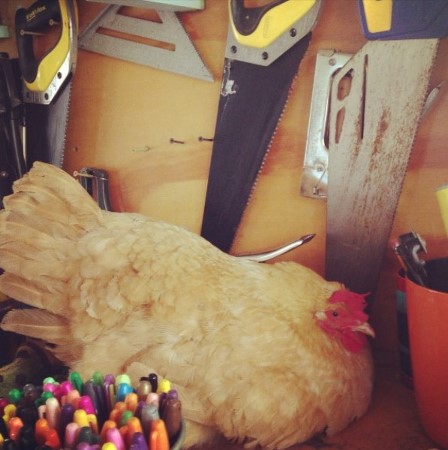 Our animals are a great asset to the Tinkering School. They are often the first thing that kids connect with when arriving; they help in adjusting to the new environment. They’re a comfort and provide a lot of comic relief and entertainment!
Our animals are a great asset to the Tinkering School. They are often the first thing that kids connect with when arriving; they help in adjusting to the new environment. They’re a comfort and provide a lot of comic relief and entertainment!
—Kami Wilt, director and founder, Austin Tinkering School
 We have chickens, a donkey, two mama goats, and three baby goats at Inside Outside School, with more babies due any day. The students feed the animals, collect eggs, hang out in the barnyard, and love on our animal friends. Soon we will all be learning how to milk a goat and how to make cheese and soap.
We have chickens, a donkey, two mama goats, and three baby goats at Inside Outside School, with more babies due any day. The students feed the animals, collect eggs, hang out in the barnyard, and love on our animal friends. Soon we will all be learning how to milk a goat and how to make cheese and soap.
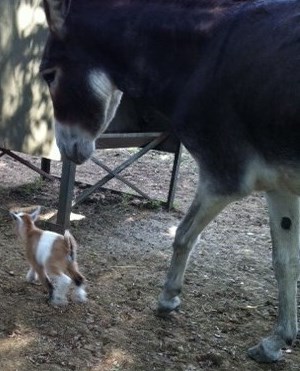 The students have integrated study projects to learn more about animal husbandry and also grow foods in the garden for the animals. Three of our own hens’ eggs hatched last spring, and the students got to watch them grow and change daily. In a world that sometimes seems short on compassion, caring for animals is one incredible way to grow children with big hearts!
The students have integrated study projects to learn more about animal husbandry and also grow foods in the garden for the animals. Three of our own hens’ eggs hatched last spring, and the students got to watch them grow and change daily. In a world that sometimes seems short on compassion, caring for animals is one incredible way to grow children with big hearts!
—Deborah Hale, executive director, Inside Outside School
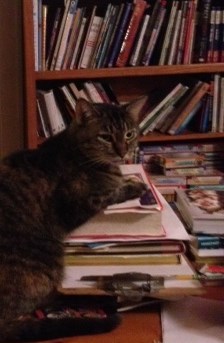
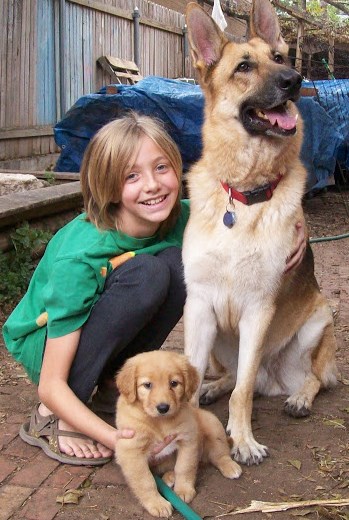
Animals are an important and personal way to experience the life cycle and to accept and marvel at how amazing it is.
—Paula Estes, director and teacher, The Living School
 They love us no matter what, and they teach us to love and care for something other than just ourselves.
They love us no matter what, and they teach us to love and care for something other than just ourselves.
—Adam, student, The Living School
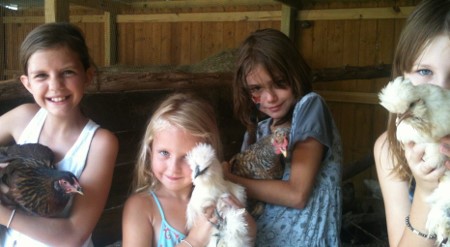 The kids absolutely love them! At Whole Life Learning Center we have 20 chickens, a goat named Eleanor, and a mini-donkey named Gertrude. The kids help with their daily care, collecting eggs and tossing chicken scratch, putting out hay and water, and, most importantly, giving them love and attention. They learn about meeting those basic needs as well as some of the more involved aspects of animal husbandry, like training a stubborn donkey to walk on a lead!
The kids absolutely love them! At Whole Life Learning Center we have 20 chickens, a goat named Eleanor, and a mini-donkey named Gertrude. The kids help with their daily care, collecting eggs and tossing chicken scratch, putting out hay and water, and, most importantly, giving them love and attention. They learn about meeting those basic needs as well as some of the more involved aspects of animal husbandry, like training a stubborn donkey to walk on a lead!
The kids are so sensitive to the animals’ needs; it’s beautiful to see their senses of empathy and responsibility develop in relation to our feathered and four-legged friends. And it goes both ways: when a child needs some quiet time or wants to practice reading, she can go sit with Gertrude and Eleanor and chat or read with them—good friends always listen.
Oh, and finally, they get to see how the animals fit into the whole ecosystem. The chickens give us tasty eggs, the donkey protects the chickens from predators (and protects the gardens from vegetarian predators too), and Gertrude and Ellie serve as our lawn service, complete with fertilizer for the gardens!
—Michael Carberry, founder, director, and mentor,
Whole Life Learning Center
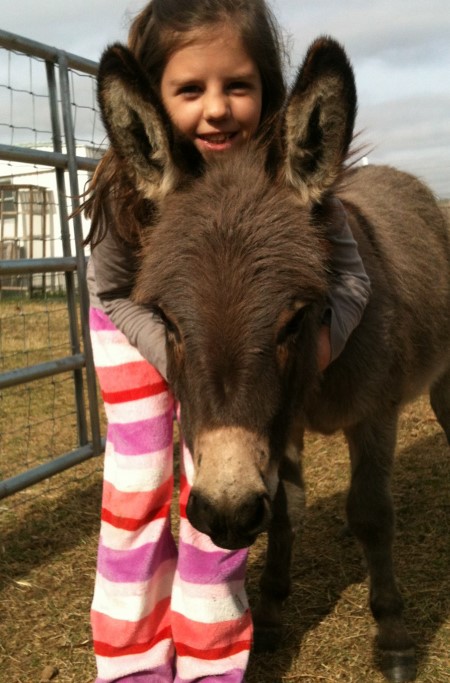 Hi, my name is Averi, and I’m a student at the Whole Life Learning Center. It is a really awesome school and we really love animals. This school really helps fullfill my passion for animals because it has tons of animals, like Gertrude the mini donkey, Ellie the goat, and a lot of chickens. I think that animals can teach just as well as humans, just different things. As Nelly, one of my friends at WLLC, says, “Animals can be teachers too!” Human teachers teach stuff like math, reading, and writing, and animals teach things like love, responsibility, and a sense of purpose. I wrote a quote: “You can study all you want, but true learning comes from experience.”
Hi, my name is Averi, and I’m a student at the Whole Life Learning Center. It is a really awesome school and we really love animals. This school really helps fullfill my passion for animals because it has tons of animals, like Gertrude the mini donkey, Ellie the goat, and a lot of chickens. I think that animals can teach just as well as humans, just different things. As Nelly, one of my friends at WLLC, says, “Animals can be teachers too!” Human teachers teach stuff like math, reading, and writing, and animals teach things like love, responsibility, and a sense of purpose. I wrote a quote: “You can study all you want, but true learning comes from experience.”
—Averi, student, Whole Life Learning Center
Teri
























